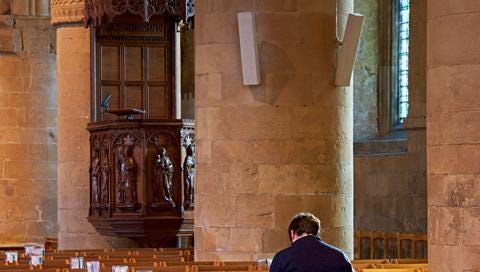Christians have to let Jesus go
New research into atheism shows the way forward, writes George Pitcher
The Times of London last week announced that Britain has entered its “first atheist age”, as parents increasingly “fail” (interesting word that) to pass on religious beliefs to their children.
This is fascinating for a variety of reasons, not least because it pushes back on recent reports that the New Atheists of a couple of decades ago are being displaced by New Theists, such as Ayeen Hirsi Ali and Tom Holland.
The evidence in The Times comes from a study conducted by Explaining Atheism, which found, unsurprisingly, that not only children of non-religious parents, but also those of religious parents who don’t participate in religious rituals, are likely to grow up as non-theists.
Here we go, those of faith may mutter, wearily rolling their eyes at yet another atheist research project that “proves” atheism is the new normal and life without God is liberating and healthy. Except Explaining Atheism isn’t like that.
For one thing, it’s funded by the John Templeton Foundation, which is hardly an atheist lobby group. Wizard investor and philanthropist Templeton himself was a lifelong member of the Presbyterian Church and a long-standing trustee of Princeton Theological Seminary. His foundation invests in highly scrutinised and worthwhile explorations of the presence and future of spirituality.
Tired old responses
So Explaining Atheism is to be taken seriously, even reverently. Its process problem is that it’s likely to be met with the usual tired old responses from the UK’s Christian churches: Bums in pews isn’t what it’s about now that church attendance isn’t a societal requirement; congregations are growing in cathedrals and the world’s (still) largest faith by an enormous margin is booming in other places, such as Africa; people who claim a spirituality remain a vast majority.
On that last point, there is a significant view that it’s not just spirituality that is common, but quasi-religious devotion to other iconic causes – climate change, for example, or nationalism in the form of demagogues such as Donald Trump.
“Spawned its own superstition”
James Marriott of The Times, an atheist himself, followed up Explaining Atheism’s project news with a characteristically thoughtful column arguing that the vaunted atheist age has “spawned its own superstition”; far from ushering in an era of reason and reverence for science, we have “a plague of secular fools”, from conspiracy theorists to anti-vaxers to addicts of fake news.
To his credit, Marriott avoids the old GK Chesterton saw that when we cease to believe in God, we don’t believe in nothing, but in anything. But his view comes close.
I know James a bit and count him a friend. I hope he won’t mind me saying that he and his similarly unbelieving father, Richard (there perhaps is the generational pass-on), have been regularly irregular members of my congregation in Sussex. I believe they love singing Christmas carols. They certainly look like they do. I suspect it’s the rest of what they might call our our hocus-pocus that they don’t buy into.
Attempts to be trendy
Historically, the Church’s response has been to try to do worship “better” for people like Richard and James. This has spawned excruciating attempts to be trendy, with bands and songs, modernised communion rituals, debates on current affairs that are somehow meant to be different because they’re on consecrated ground.
I want to suggest a rather more radical alternative. It is that we have to let church go. It’s a minority interest for people and we’re not going to get them back. Our Christian faith has to be enacted in the world, in our economy, in our politics, in all the ways we live our lives.
Happily very many do this already. It’s just that too many of us are still stuck in church, counting heads, and telling them to go out into the world to spread the good news. No, it’s the other way around. We need to live the faith in the world, loving neighbours as ourselves, then – just perhaps – some numbers will be attracted to find out what started this world movement, in the Eucharist. But the overriding aim isn’t to get them into church, it’s to meet them outside it.
He died, properly dead
There’s a corollary to this missionary rubric and it’s a controversial one: We have to let Jesus go too. He told Mary of Magdala as much outside his tomb. Our faith tells us he died, properly dead, not simply fell asleep for a bit, like some Christological version of Sleeping Beauty.
The mystery of a risen Christ in the world is what we hold to – and its evidence over two millennia. Not banging on about the life of our founder, Jesus of Nazareth, in churches on Sunday, however important that may be to us as a cornerstone. The priority must be to show faith out in the world.
Dr Lois Lee, a principal investigator with Explaining Atheism and a senior lecturer at the University of Kent, speaks gospel truth when she says: “It’s not talking the talk that matters, it’s walking the walk.” Walk on, sister.
George Pitcher is a visiting fellow at the LSE and an Anglican priest
A version of this column first appeared on PremierChristianity





Excellent if read by other priests lets hope they leave their vicarages and meet the people. Once in our small town we saw walking the roads, the C of E Priest, the Catholic Priest and the Methodist minister. The latter with his bible alwasy under his arm. Noww rhey are never seen.
So interesting. Big fan of James Marriott’s writing too